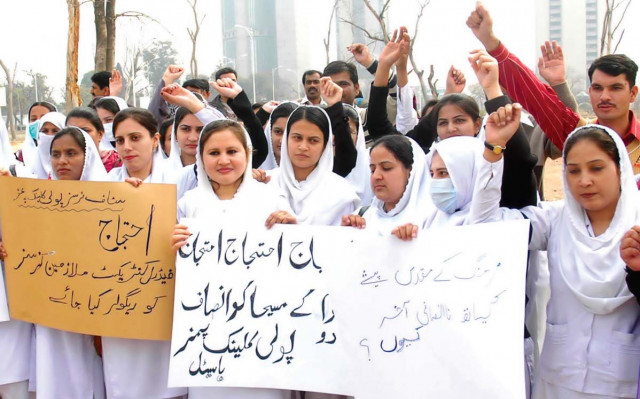Protesting paramedics: A life without promotions
Government health institution paramedics launch weeklong protest against delay in implementation of service structure.

Talking to The Express Tribune, the federation’s secretary-general Mohammad Arshad said that the ministry of health had approved a service structure for all health professionals in June 2010, but it has not yet been implemented. “The paramedics across the country have been demanding their rights for the past seven months.”
He said the paramedic staff will continue to wear black armbands till February 7 to press their demands and if no practical steps were taken by the health ministry by then, they [staff] will start holding token strikes from February 8 to 16. After that, the paramedics will take to the streets.
“It is difficult for the paramedics to work without a service structure as they don’t know if you will ever get promoted,” said Arshad. Paramedics spend their entire professional lives stagnant on the same position they were hired in, he added.
Talking to the Tribune, NHEPRN National Coordinator Dr Jahanzeb Aurakzai said, “They [the paramedics] have not shared their demands clearly and we are trying to understand exactly what they are asking for.” Things have changed after the 18th Constitutional Amendment and the matter between the federal and provincial levels have become complicated, he said.
“We are assessing the matter and things will be clear once we talk face to face,” he added.
The federation’s secretary-general said that a national commission, constituted in 2005 at the federal level, gave its recommendations for developing a service structure for paramedics. Although the service structure was approved, “no progress has been witnessed in its implementation to date,” he said.
Arshad said there are seven hospitals across the country that comes under this commission, four in Islamabad and Rawalpindi and three in Karachi. These include Pakistan Institute of Medical Sciences (Pims), Polyclinic Hospital, National Institute for Rehabilitative Medicines (NIRM) and Tuberculosis Centre in Rawalpindi and Islamabad. While the National Institute of Child Health, Jinnah Post Graduate Medical Centre and Central Health Establishment are included from Karachi.
He said that it is “unfortunate” that the profession of paramedics, once considered the back-bone of the health system, has become discouraging to new comers. “If we ask our children, friends or relatives to join this profession, they refuse by saying that there is no professional growth in it.”
Arshad said that the duties of paramedics are tougher then other senior health staff and are more prone to health hazards. Working in radiology laboratories as radiographers or x-ray technicians, the paramedic staff are exposed to dangerous diseases such as tuberculosis, cancer and hepatitis, among others, he said.
Published in The Express Tribune, February 2nd, 2011.



















COMMENTS
Comments are moderated and generally will be posted if they are on-topic and not abusive.
For more information, please see our Comments FAQ